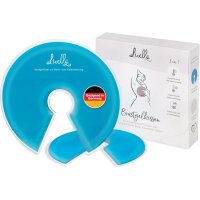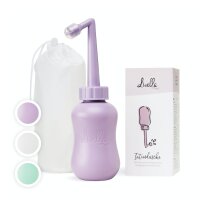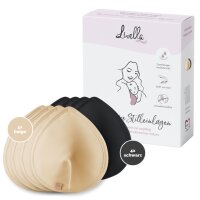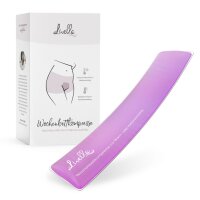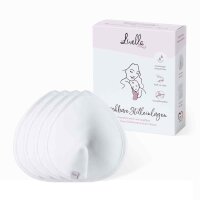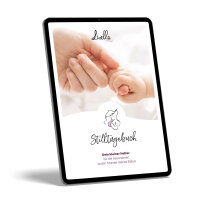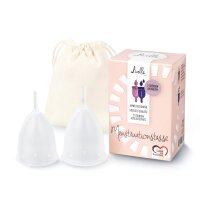Loud gut noises, diarrhoea and bloating. If their breastfed babies show signs of digestive issues, most mums are immediately alarmed and suspect that their baby might be intolerant to breast milk.
Lactose intolerance in babies is very rare. After all, breast milk is the natural source of nutrients and energy for babies. In some cases, however, a breastfed baby might actually be lactose-intolerant.
What does lactose intolerance in newborns mean for breastfeeding? What are the signs of lactose intolerance in babies? Can breastfeeding cause lactose intolerance? And is it possible to continue breastfeeding despite diagnosed lactose intolerance?
Table of contents
Lactose intolerance in babies: frequency and types
Signs of lactose intolerance in babies
Lactose intolerance in babies: diagnosis and treatment
Lactose intolerance in newborns: is breastfeeding even an option?
Lactose intolerance in newborns: breastfeeding tips for mums
Lactose intolerance in babies: when should breastfeeding mums change their diet?
Is it possible to prevent lactose intolerance in babies through breastfeeding?
A final word on lactose intolerance in newborns and breastfeeding
Lactose intolerance in babies: frequency and types
Lactose intolerance in babies doesn’t occur often. It is estimated that only between 1% and 3% of all babies are lactose-intolerant from birth. These low numbers shouldn’t come as a surprise, given that babies are naturally fed exclusively on lactose-rich breast milk in the first few months.
There are two types of lactose intolerance in babies: primary lactose intolerance (also known as congenital lactase deficiency) and secondary lactose intolerance, which is a temporary condition. In the case of congenital lactase deficiency, the infant’s gut is unable to produce the enzyme lactase which is needed for breaking down the lactose contained in breast milk. Congenital lactose intolerance in babies is a genetic condition.
Babies can further develop a temporary lactose intolerance. Although this type of lactose intolerance also typically occurs shortly after birth, it disappears again within a few months. A temporary intolerance to lactose is usually due to the fact that the baby’s gut is not sufficiently developed to produce enough enzymes to break down the lactose contained in the mother’s milk.
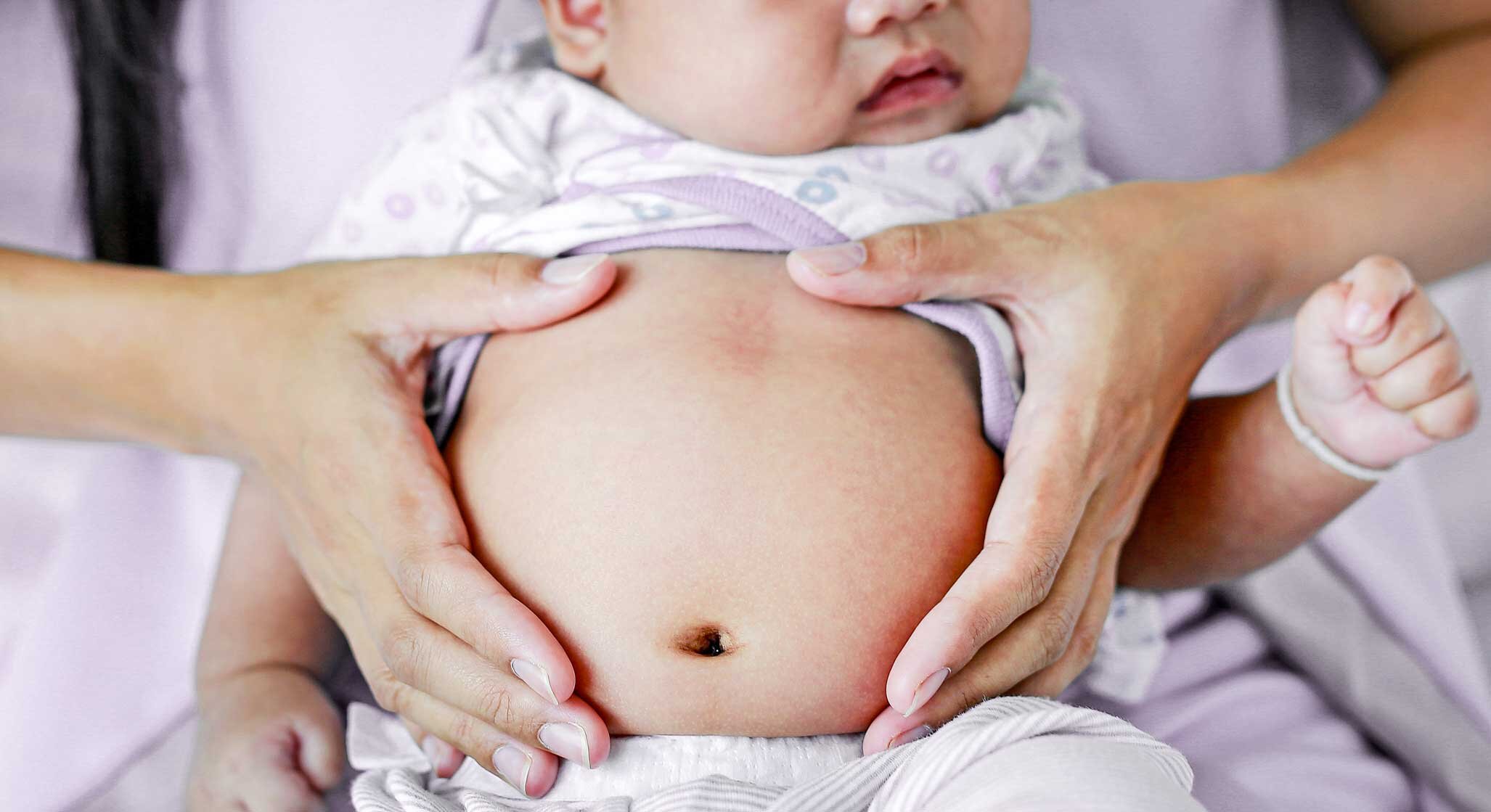
Signs of lactose intolerance in babies
Mums who notice something wrong with their baby’s digestion often wonder: “How do I know if my breastfed baby is lactose-intolerant?” If you are concerned that your baby may be intolerant to breast milk, you should look out for the following symptoms:
- Flatulence, audible gut noises and abdominal pain
- Diarrhoea or other changes in bowel motions
- Increased burping and crying after breastfeeding
- Signs of dehydration (due to diarrhoea) and lack of weight gain (or even weight loss)
Another question that often comes up in this context is: What does lactose-intolerant baby poop look like? Lactose-intolerant babies often have loose, green, frothy bowel motions.
However, you must not forget that these signs are not exclusive to lactose intolerance in breastfed newborns. There can be numerous other reasons why a baby is restless at the breast, has diarrhoea or flatulence, or burps violently after having been breastfed.
For instance, an overactive let-down reflex can also lead to strong burping after breastfeeding just as taking certain types of medication while breastfeeding can cause discomfort for your baby.
An important thing to remember is that soft bowel motions do not always mean diarrhoea. Soft stools with a yellowish colour are normal for breastfed babies and are therefore no reason for being concerned.
Lactose intolerance in babies: diagnosis and treatment
It is not always easy to diagnose lactose intolerance in babies. Although there are various medical tests (e. g. blood glucose test or H2 breath test) that can show whether lactose intolerance is really present, it is hard to carry out these tests on a baby.
An alternative method to determine whether or not your baby is intolerant to breast milk is to temporarily switch to feeding lactose-free formula. The test period typically lasts for a few weeks to see whether the symptoms improve after the lactose is removed from the baby’s diet.
How do you treat lactose intolerance while breastfeeding? This is a common question among new mothers. The treatment for babies who have been diagnosed with lactose intolerance is usually the same as for lactose-intolerant adults. This means switching to a special lactose-free diet.
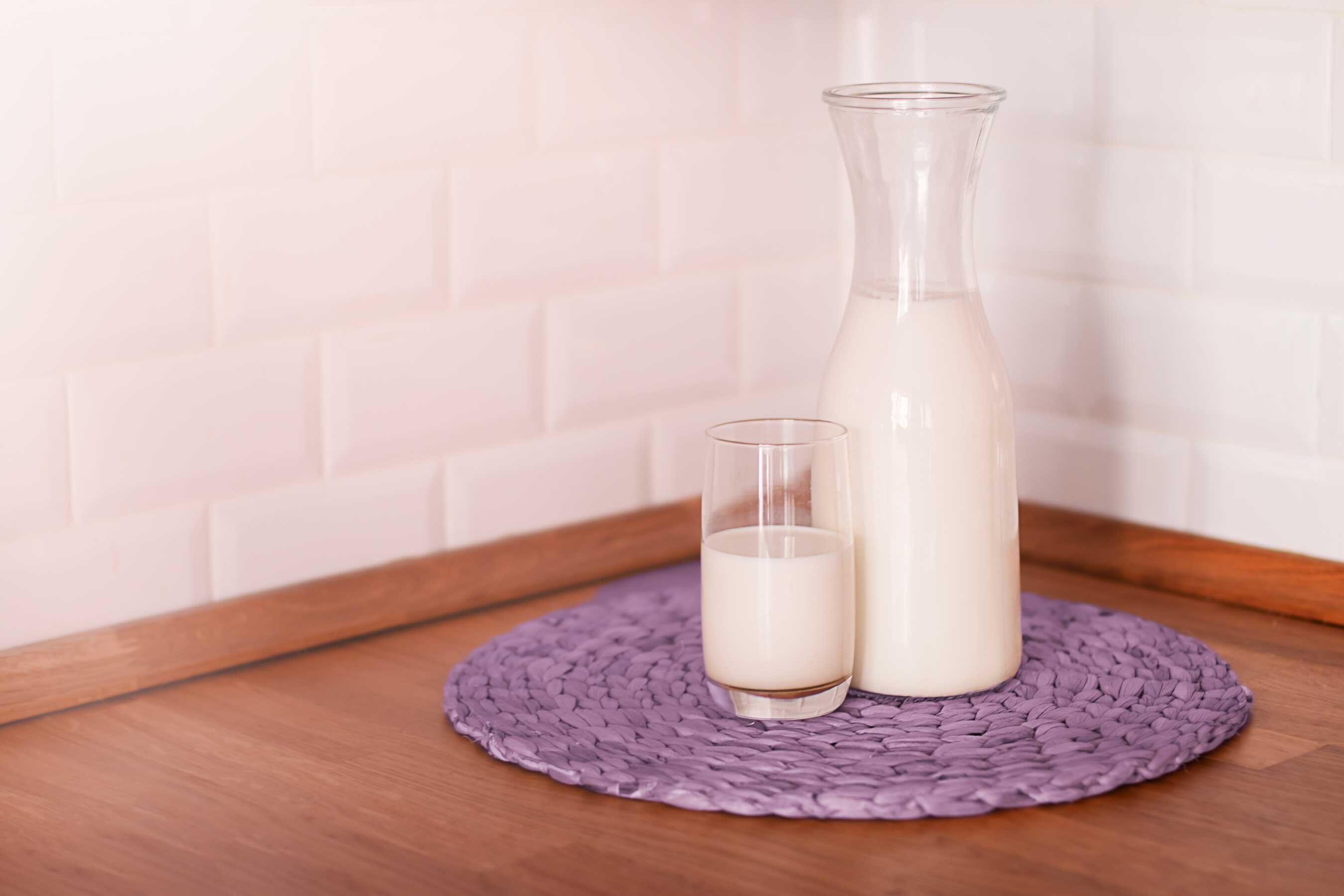
Lactose intolerance in newborns: is breastfeeding even an option?
Breast milk contains lactose, which means that it can cause digestive issues in a lactose-intolerant baby, typically resulting in diarrhoea, flatulence and other common symptoms of lactose intolerance. However, there is no general consensus among experts that the best treatment for lactose intolerance in newborns is to stop breastfeeding and replace breast milk with lactose-free formula milk.
Breast milk is still widely considered the best food for babies, even for those with lactose intolerance. That’s because of the many benefits breast milk holds for newborns compared to formula. Also, there are various tricks that can help ensure that a lactose-intolerant baby can drink and digest breast milk without suffering from the usual symptoms.
Lactose intolerance in newborns: breastfeeding tips for mums
Lactose intolerance in newborns and breastfeeding are not incompatible. Here are a few tips for breastfeeding a lactose-intolerant baby:
- Express breast milk and add enzymes to it: One way of ensuring your lactose-intolerant baby can digest breast milk is to express milk by hand or with a breast pump and add lactase enzymes to it before feeding the milk to your baby. The enzymes break down the lactose in your milk so that it can be absorbed by your baby’s gut. Which enzymes to use and in which quantity should be discussed with your paediatrician.
- Only offer one breast per feed: Foremilk contains a particularly high amount of lactose. If you switch your baby to the other breast before the first one has been properly emptied, this can result in double-feeding the lactose-rich foremilk while skipping over the hindmilk which is rich in fat and calories. Drinking excessive amounts of foremilk can lead to your baby showing signs of lactose intolerance. To prevent this, you should stick to the rule of only offering one breast per feed and have your baby empty that one properly.
- Get support from your partner, family and friends: Lactose intolerance in babies can be quite hard to deal with. Seeing your little one suffer from discomfort, bloating and diarrhoea will be hard for you as a new mother. That's why it's important to make sure that you are not alone in this. Ask your partner, family or friends to help out. Getting professional support from a midwife or lactation consultant is also a great idea because they can give you lots of helpful tips on how to best deal with the situation.
- Adjust your breastfeeding diet: Eating a healthy breastfeeding diet is extremely important. Not only because your body needs additional energy to make milk, but also because what you eat has a direct impact on the concentration of certain micronutrients in your breast milk. Your diet further plays an important role when it comes to your baby’s lactose intolerance. In the next section, we will tell you exactly how your own diet and your baby's lactose intolerance are linked.
Lactose intolerance in babies: when should breastfeeding mums change their diet?
First things first, switching to a lactose-free diet does not remove the lactose from your breast milk. This is because the basic composition of breast milk, i. e. the quantities of carbohydrates, fats and proteins it contains, does not depend on what you eat. Nevertheless, there can be a connection between your diet and your baby's digestive issues.
Real lactose intolerance (i. e. congenital lactase deficiency) is very rare in babies. What is more common, however, is a cow's milk allergy. A cow's milk allergy has similar symptoms to lactose intolerance. But the fundamental difference is that it is not the lactose that is responsible for the problems in your baby's gastrointestinal tract, but certain proteins contained in cow's milk.
If you consume a lot of products made from cow's milk, some of these proteins can pass into your breast milk and cause problems in your baby's gut. If your baby has a cow's milk allergy, you should eliminate dairy products from your diet.
In order to ensure that all your nutritional needs are met, it might be necessary to take supplements while breastfeeding. Before going for a random supplement, however, you should discuss your planned dietary changes with your doctor or nutritionist.
Is it possible to prevent lactose intolerance in babies through breastfeeding?
Lactose intolerance in a newborn and breastfeeding are not mutually exclusive. With some adjustments, you can continue breastfeeding your lactose-intolerant baby and ensure that he or she gets all the valuable nutrients from your breast milk.
However, there is another aspect that should be considered when discussing lactose intolerance in babies. It’s not uncommon for new mothers to wonder if breastfeeding can cause lactose intolerance. While it’s true that breastfed babies can be lactose-intolerant because breast milk contains lactose, breastfeeding is not the cause behind lactose intolerance. Well on the contrary.
Breastfeeding can actually help prevent the development of lactose intolerance at a young age and also later in life. That is because secondary lactose intolerance is often also caused by an intestinal infection or disease. Since breastfeeding reduces the risk of various diseases of the gastrointestinal tract, it can help prevent your baby from developing a temporary lactose intolerance.
A final word on lactose intolerance in newborns and breastfeeding
Lactose intolerance in babies is a complex topic that spans many different aspects. But don’t worry. You don’t need to know everything by heart. It’s enough for new mothers to remember the following key facts:
- Lactose intolerance in babies is very rare, with congenital lactose intolerance being even rarer than temporary intolerance.
- Reasons for a temporary lactose intolerance can be a previous infection of the gastrointestinal tract or immaturity of the gut.
- With the right breastfeeding technique and the use of lactase enzymes, you can continue breastfeeding your lactose-intolerant baby. Weaning is hence not necessary.
- Digestive problems in babies can also be caused by a cow's milk protein allergy. In this case, you should temporarily remove milk and dairy products from your diet to see if it’s the cow’s milk protein that causes the digestive issues in your baby.
References
- Laktoseintoleranz | Symptome, Ernährung & Behandlung Elbdeich Apotheke Ochsenwerder Hamburg (elbdeich-apotheke-ochsenwerder.de)
- Laktoseintoleranz beim Baby? Stillen bleibt die beste Option - Still-Lexikon
- Verdauung des Babys | kindergesundheit-info.de
- Kuhmilchallergie — wie viel Diät muss sein? | SpringerLink


